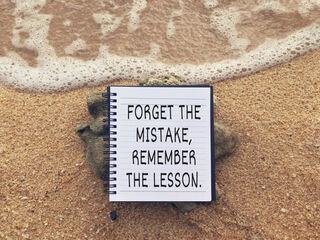Self-understanding can help you forgive yourself.
KEY POINTS
- Self-forgiveness is one of the most powerful steps you can take to rid yourself of emotional abuse’s debilitating shame.
- Self-forgiveness soothes the body and mind after the pain caused by shame and facilitates healing.
- Once you understand yourself and your actions, you can begin to work on self-forgiveness.
Shame is a persistent emotion. It can hang on long after you have escaped an emotionally abusive relationship. Every time you make a mistake, have a bad day, or experience a setback, your ex-partner’s words can rise like a monster from the depths.
Even when you find ways to quiet those critical, shaming messages, you may experience horrible shame when you realize the harm your children have endured or when you think about how long you put up with such abusive behavior.
Instead of continually shaming yourself, you need to forgive yourself. Otherwise, you will carry your shame indefinitely, making it harder to start your life anew. You need to forgive yourself for all the following: becoming involved with an abusive partner, not seeing the signs and predictors of abusive behavior, believing what the abuser told you, getting confused about who you really are, and remaining in the relationship for so long.
You may also need to forgive yourself for subjecting your children to chaos and fighting and for providing them a negative role model for how to behave in intimate relationships. Next, you need to forgive yourself for whatever actions you took or the coping mechanisms you used in order to survive the abuse.
Finally, you need to forgive yourself for the ways you have hurt others due to the abuse you suffered. This includes all your “sins” and omissions—all the ways you have caused others damage. In this and the next three posts, I will guide you step-by-step through the process of completing each of these tasks.
Self-forgiveness is one of the most powerful steps you can take to rid yourself of the debilitating shame that surrounds emotional abuse. It is not only recommended but absolutely essential—nothing is as important for your overall healing from the abuse.
It goes like this: The more shame you heal, the more you will be able to see yourself more clearly instead of through the distorted lens of your abusive ex-partner.
Instead of viewing yourself as weak or stupid or incompetent, you will be able to view yourself more realistically and realize that you, like everyone else, can make mistakes, can be imperfect, and that you still deserve to be treated with respect and consideration.
While compassion is the antidote to shame—self-forgiveness is the healing medicine. Self-compassion acts to neutralize the poison of shame, to remove the toxins created by shame. Self-forgiveness acts to soothe our body, mind, and soul of the pain caused by shame and facilitates the overall healing process.
Self-Understanding
In my latest book, Escaping Emotional Abuse, I recommend self-understanding as one of the main tools to help you forgive yourself. This includes learning how shame has shaped your image of yourself, how the emotional abuse you suffered cuts you off from important aspects of yourself and learning how trauma creates certain symptoms and behaviors that are unhealthy.
A major way to gain self-understanding is to begin to treat yourself in a “trauma-sensitive” or “trauma-informed” approach. By treating yourself in this way, you not only understand why you have behaved as you have, but you will also increase your ability to treat yourself more compassionately.
This perspective frames many “symptoms” as understandable attempts to cope with or adapt to overwhelming circumstances (such as emotional abuse) and is empathetic and potentially empowering.
The primary goal of a trauma-sensitive or trauma-informed way of thinking is to help you better understand the role that trauma has played in shaping your life. More specifically, there is a focus on helping you recognize that many of the behaviors you are most critical of in yourself (and are criticized for by others) are actually coping mechanisms or attempts at self-regulation.
Following are some of the principles of a trauma-informed way of thinking. I encourage you to adopt these principles and beliefs as you continue to focus on healing your shame (as well as other effects of the abuse you suffered).
The impact of trauma narrows a victim’s choices, undermines self-esteem, takes away control, and creates a sense of hopelessness and helplessness.
Symptoms—including troubling behaviors—need to be viewed as attempts to cope with past trauma and are seen as adaptations rather than pathology.
We need to focus on what happened to the person rather than what is wrong with the person.
Substance use and certain psychiatric symptoms may have evolved as coping strategies when options were limited.
Begin to recognize the adaptive function of any troubling behaviors you took on to cope with the abuse. For example, drinking and other forms of substance abuse often arise from a victim’s efforts to cope with high levels of anxiety—anxiety that can sometimes be intolerable.
Recognizing this and having compassion for yourself will be a significant step toward both self-acceptance and change. Once you have offered yourself self-compassion, you can then focus on learning strategies that help you feel more comforted and in control, such as writing in a journal, taking a warm bath, applying a cool washcloth to your forehead, or practicing grounding exercises or deep breathing—all of which can help with self-soothing deficits.
Instead of viewing yourself as a “bad person” because you reacted to the trauma of emotional abuse in sometimes troubling ways, you will become far less critical of yourself if you view yourself in a trauma-sensitive way. And as you come to recognize that the negative things you have done do not represent who you are at your core but are the ways that you learned to cope with the trauma you experienced, my hope is that this self-understanding will help you to forgive yourself and begin to treat yourself in far more compassionate ways.
Starting with the premise that no one is perfect and that we all make mistakes, self-understanding encourages us to view ourselves from the perspective that there is always a reason we do the things we do. For example, if you are impatient with your children, ask yourself, “Why do I treat my children this way?” “Does it have anything to do with the way my husband treats me?” “Have I grown so afraid of being judged and criticized that this fear has trickled down my children?” “Am I so afraid that I or they will be criticized that I try to encourage them to be perfect?”
Or could one or both of your parents be impatient with you, and you are passing this behavior down to your children? Did you become impatient and critical of yourself and then pass this tendency down to how you interact with your children?
If either of these scenarios is true for you, then it is understandable that you would become impatient with your children. Understanding why you act as you do is not the same as excusing your behavior. It is merely choosing to come from a place of self-understanding rather than a place of criticism. It is the difference between seeing yourself as bad for being imperfect and seeing yourself as human.
It is understandable that if we are treated with impatience, criticism, harshness, and a lack of acceptance, we will treat others—especially our children—the same way. We aren’t saints. When we are treated poorly, it affects us deeply. It changes our basic personality structure. As the saying goes, “Hurt people, hurt people.” Once you understand yourself and your actions, you can begin to work on self-forgiveness.
The Obstacles to Self-Forgiveness
Just as you probably had a lot of resistance to self-compassion, you may resist the idea of self-forgiveness. You may view self-forgiveness as “letting myself off the hook.” But this is not what we are talking about.
We are talking about taking responsibility for your actions but not continuing your relentless self-criticism. Beating yourself up for getting into an abusive relationship or the ways you coped with it isn’t going to help anyone, including yourself. And it certainly won’t help you to move forward.
The more shame you feel about your past actions and behaviors, the more your self-esteem is lowered, and the less likely you will feel motivated to change. And without self-forgiveness, your level of shame will cause you to defend yourself from taking on more shame by refusing to see your faults and not being open to criticism or correction. Self-forgiveness opens the door to change by releasing resistance and deepening your connection to yourself.
You may also ask, “Why should I forgive myself? After all, it won’t help those I’ve harmed.” The most powerful reason: If you do not forgive yourself, the shame you carry will compel you to continue to act in harmful ways toward others and yourself.
Forgiving yourself will help you heal another layer of shame and free you to continue becoming a better human being. Without the burden of self-hatred you have been carrying around, you can transform your life.
References
Engel, Beverly. Escaping Emotional Abuse. (2021) New York, N.Y. : Citadel Press.




Leave A Comment